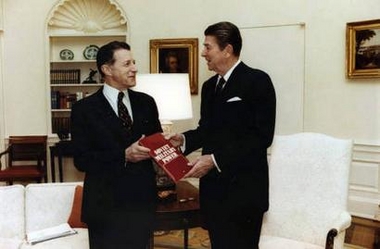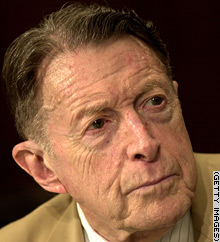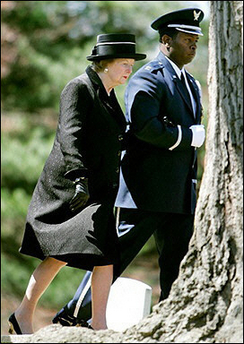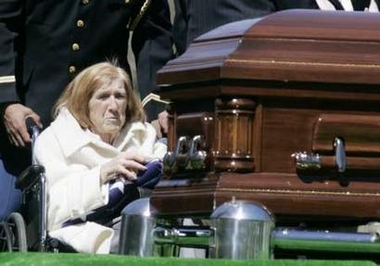NEWS RELEASES from the United States Department of Defense
No. 254-06 IMMEDIATE RELEASE
March 28, 2006
Statement from Secretary Rumsfeld on the Death of Caspar Weinberger
Today the men and women of the Department of Defense mourn the loss of a soldier, a public servant, and great patriot — The Honorable Caspar Weinberger.
Cap Weinberger served our country in the Pacific theater during World War II, entering as an Army private and ending the war as a Captain on General MacArthur's intelligence staff. He was a leader in California's business community and served three Presidents with distinction.
As Secretary of Defense under President Ronald Reagan, he guided the Department through a pivotal time in the Cold War, when America rebuilt its defenses and regained its confidence. He championed the President's historic defense build-up, placing a priority on the systems and initiatives that best supported our troops and helped to win the Cold War. He was a strong advocate for a missile defense program to defend the American people from the designs of hostile regimes.
When he departed the Pentagon, Secretary Weinberger left the United States Armed Forces stronger, our country safer, and the world more free. There is no finer legacy.
Our thoughts and prayers are with him and his family.
Caspar Weinberger, who oversaw the Pentagon's biggest peacetime spending increase as President Ronald Reagan's defence secretary and later was indicted for his role in the Iran-Contra affair, died Tuesday. He was 88.
Weinberger had been hospitalized in Bangor, Maine, with a high fever and pneumonia brought on by his age, according to his son, Caspar Weinberger Jr.
“He left the U.S. armed forces stronger, our country safer and the world more free,” said Defence Secretary Donald Rumsfeld.
Weinberger served as President Richard Nixon's budget director and was given the nickname Cap the Knife for his efforts to slash government spending. Yet Weinberger's best-known role may have been as Reagan's defence secretary, when the classic cold warrior presided over a cumulative $2 trillion in military spending.
Determined to ensure U.S. strategic strength to counter the Soviet Union, Weinberger pushed Congress to fund such programs as the Strategic Defence Initiative, Midgetman and MX missiles, B-1B bombers and stealth aircraft.
But it was also during this time that reports surfaced of excesses at the Pentagon, from $600 US toilet seats to $400 hammers. Cartoonists had a field day portraying Weinberger with toilet seats around his neck.
In a Feb. 10, 1986, interview with the Washington Post, Reagan defended his defence secretary. “That's the same price that TWA and Delta and United pay. It is a moulded cover for the entire toilet system. And, yes, it does cost about that much.”
Supporters contended the defence buildup helped cause the collapse of the Soviet Union.
“His legacy is a strong and free America, and for this and for a lifetime of selfless service, a grateful nation thanks him,” former first lady Nancy Reagan said Tuesday.
A lifelong Republican, Weinberger's early interest in politics and government – sparked by his father, a lawyer – led him to the Pentagon and White House.
But his work also led to a trouble – federal felony charges stemming from his alleged role in the sale of weapons to Iran to finance secret, illegal aid to the Nicaraguan Contras.
The “arms-for-hostages” affair poisoned the closing years of Reagan's administration and permanently stained the reputations of the insiders involved.
In one of President George H.W. Bush's final official acts after his 1992 loss to Bill Clinton, he granted Christmas Eve pardons to Weinberger and five others accused in the affair. Bush was Reagan's vice-president.
Weinberger, 75 at the time, had been scheduled to stand trial in less than two weeks on charges that he concealed thousands of pages of his handwritten notes from congressional investigators and prosecutors.
He'd earlier rejected independent counsel Lawrence Walsh's plea-bargain offer to testify against his longtime friends and colleagues – including Reagan – and plead guilty to a misdemeanour.
Weinberger had said he was innocent of all the charges and considered the indictment a political attack.
After the pardon was announced, Walsh alleged that “the Iran-Contra coverup, which has continued for more than six years, has now been completed.”
Weinberger's son said Tuesday, “My father was just a world diplomat, a No. 1 great American patriot. He always stayed the course. He always had beliefs, he held to those beliefs.”
In 1989, Weinberger, a self-described “frustrated newspaperman” – he was president of the Harvard Crimson – joined Forbes to become the magazine's fourth publisher. In 1993 he was named chairman of Forbes Inc.
Weinberger occasionally spoke out on current affairs in recent years. In 1996, he criticized then-Defence Secretary William Perry for refusing to announce publicly that the U.S. would defend Taiwan if China fired missiles at the island.
He told a Nebraska group in 1999 that despite victories in the Cold War and Gulf War, the United States still faced threats.
“Peace alone is not enough. Peace can even mean slavery sometimes. Peace and freedom is what we have to have,” Weinberger said.
In 1983, he argued that a force of U.S. marines stationed at Beirut's airport was too small and lightly armed, calling them a “disaster waiting to happen.” On October 22, 1983, 241 marines and sailors were killed in attacks on the barracks.
In an interview with PBS' Frontline in late September 2001, Weinberger said, “The fact that I had been warning against this very thing didn't give me any slight satisfaction, I can assure of that. It was terrible to be proven right under such horrible circumstances.”
Born August 18, 1917, in San Francisco, Weinberger attended Harvard, graduating in 1938 and getting his law degree from Harvard in 1941. He served in the infantry in the Pacific in the Second World War.
His death came a day after the passing of another Reagan administration official, press secretary and political adviser Franklyn Nofziger.
Besides his son, Weinberger is survived by a daughter, Arlin Weinberger, and his wife of 63 years, Jane. All three were at his bedside when he died.
A statement from Weinberger's family said funeral arrangements at Arlington National Cemetery are pending.
Caspar Weinberger, who oversaw a massive U.S. military buildup as Ronald Reagan's defense secretary, died on Tuesday, 28 March 2006, at age 88.
Weinberger, who was a central figure in the Iran-Contra scandal during the Reagan administration, had been suffering from pneumonia and high fever for about a week.
His son, Caspar Weinberger Jr., said his father died at 5 a.m. in the intensive-care unit of Eastern Maine Medical Center in Bangor, about 40 miles from his home in Mount Desert. Weinberger's wife of 63 years, Jane, his son and daughter, Arlin, were at his bedside when he died.
“He was just a worn-out guy,” Caspar Jr. told Reuters.
As head of the Pentagon, Weinberger was Reagan's zealous Cold War ally, presiding over an unprecedented peacetime military buildup costing more than $1 trillion.
He strongly opposed concessions to Moscow in arms control negotiations and pushed hard for increased defense spending, such as Reagan's Strategic Defense Initiative, a program to develop a land-and-space-based missile shield commonly known as “Star Wars.”
“He should be remembered as a world statesman, a great American patriot,” the son said. “What he did with Reagan really brought down the Soviet Union. They stuck to their plan and simply outspent the Soviets despite all sorts of doubts here.”
Weinberger became caught up in the Iran-Contra scandal that bedeviled the Reagan administration. He resigned as defense secretary in 1987 and afterward was indicted on felony counts of lying to the independent counsel investigating the administration's program for selling missiles to Iran and giving the proceeds to the right-wing Contra forces fighting Nicaragua's socialist Sandinista government.
PARDONED BY FIRST BUSH
He was pardoned by the first President Bush in 1992 days before he was to go on trial.
In 1985 Weinberger had called the Iran missile plan “absurd” but supported Reagan a year later after the president decided to send missiles and spare parts to Tehran.
“He was someone who encouraged me throughout my career when I was a young academic and a young member of government,” Secretary of State Condoleezza Rice told reporters. “He was a wise man and a great public servant. He will be missed. His advice was sought even in recent times.”
Defense Secretary Donald Rumsfeld praised Weinberger for making “the United States armed forces stronger, our country safer and the world more free.”
“His extensive career in public service, his support for the men and women in uniform and his central role in helping to win the Cold War leave a lasting legacy,” he said.
Despite his reputation as a big spender at the Pentagon, Weinberger began his Washington career as a cost-cutting budget director under President Richard Nixon.
But when he took the defense job under Reagan in January 1981, he soon erased that image and the nickname of “Cap the Knife” that came with it. He persuaded the U.S. Congress to spend more than $1 trillion on arms in Reagan's first term and billions more after that.
A longtime member of Reagan's inner circle of California friends, Weinberger was one of the president's strongest supporters in the Cabinet.
“He was just a great American,” Caspar Jr. said. “He was a respected world diplomat, a member of ‘the greatest generation,' as Tom Brokaw called it.”
Weinberger also served as secretary of Health, Education and Welfare under presidents Nixon and Gerald Ford.
The younger Weinberger said his father, who was born in San Francisco and served in the California legislature, was “first and foremost a Californian” but had moved to Maine for the benefit of his wife, a native of the state. The Weinbergers first bought a summer home in Maine in the mid-1970s and had lived there full time for the past few years.
Weinberger was a Harvard-educated lawyer and served on General Douglas MacArthur's intelligence staff during World War Two, his family said. At the time of his death he was chairman of Forbes Inc. and before that had been publisher of the magazine.
His funeral will be held at Arlington National Cemetery.
March 28, 2006
Caspar W. Weinberger Dies at 88
Caspar W. Weinberger, who held high positions under three Republican Presidents and oversaw the biggest and costliest military buildup in peacetime history as Ronald Reagan's secretary of defense, died yesterday in Bangor, Maine, after a brief illness. He was 88.
Mr. Weinberger was a resident of nearby Mt. Desert, Maine. His son, Caspar Jr., also of Mt. Desert, said his father had been undergoing kidney dialysis for two years and succumbed to pneumonia. His wife of 63 years, Jane, was by his side when he died, his son said. Until his death, Mr. Weinberger was chairman of Forbes Inc. He had continued to travel around the world until recently and had written a regular column for Forbes magazine, his son said. The elder Mr. Weinberger's book “Home of the Brave: a Tribute to Unsung Heroes in the War on Terror,” co-written with Wynton C. Hall, will be published in June by Forge Press.
A self-assured man and a tenacious debater, Mr. Weinberger served in Washington off and on for almost two decades and was a key backer of President Ronald Reagan's missile-based Strategic Defense Initiative, popularly known as Star Wars. He was also an implacable foe of the Soviet Union, a posture that put him increasingly at odds with Secretary of State George P. Shultz, who leaned more toward arms-control negotiations with Moscow.
By the time Mr. Weinberger left the Pentagon in 1987, President Reagan had been persuaded by Mr. Shultz (who had the president's wife, Nancy, in his corner). The president who had once derided the Soviet Union as “an evil empire” got along well with Mikhail S. Gorbachev, a Russian leader who seemed cut from different cloth than his drab but ruthless predecessors.
Mr. Weinberger never lost his bone-deep suspicion of the Russians, and his comments after the collapse of the Soviet Union suggested that he still had more faith in arms than diplomacy, at least in dealing with the Kremlin.
Many felt Mr. Weinberger's record was marred late in life by questions about his role in the Iran-contra affair — questions a presidential pardon left unresolved — but his résumé was impressive by any standard.
Under President Richard M. Nixon, he was chairman of the Federal Trade Commission; deputy director and later director of the Office of Management and Budget, where he earned the nickname Cap the Knife by smilingly arguing against requests for more money; and secretary of health, education and welfare.
He remained as secretary of H.E.W. under President Gerald R. Ford until 1975, when he left Washington for his native California. He said his wife could better cope with her arthritis there.
It was after he returned to the capital as defense secretary for President Reagan in 1981 that Mr. Weinberger made his real mark. His mission, he said early on, was “to rearm America.” Previous efforts to get along with the Russians without demanding good behavior in return had reinforced “the Soviet prison wall,” which Mr. Weinberger said “stretches all the way from the Balkans to the Baltic.”
Nor was vigilance against Moscow enough. “If we value our freedom, we must be able to defend ourselves in wars of any size and shape and in any region where we have vital interests,” he said in a speech in Chicago in 1981. And the rise of the charismatic Gorbachev in the mid-1980's did not soften those views. “I don't think just because he wears Gucci shoes and smiles occasionally that the Soviet Union has changed its basic doctrines,” Mr. Weinberger said in 1987, as he was leaving office.
So while other parts of the federal bureaucracy were cringing under the cut-to-the-bone philosophy of the Reagan White House (as the old Cap the Knife might have desired), Mr. Weinberger demanded billions more for long-range nuclear arms, ships, planes and tanks. “This is not a one-year program for summer soldiers,” he warned in 1981.
He was true to his word. Year after year, he fought for — and usually won — big increases in Pentagon spending.
In April 1982, he conceded that the United States had more long-range missiles than did the Soviet Union. But, he warned, the Soviet missiles were more accurate than America's.
Mr. Weinberger also tried to alleviate the ancient problem of rivalries among the services. He ordered the branches to find more roles for women. He delegated more planning authority to the chiefs of staff and the service secretaries so he could devote more time to policy.
The only blemish in his 35 years of public service came in 1992, five years after he left the Cabinet. That year, he was indicted on felony charges of perjury and obstruction of justice in connection with the covert sale of arms to Iran and the diversion of some of the proceeds to the Nicaraguan rebels, or contras.
The tangled transactions, which came to be known as the Iran-contra affair, were against the declared policy of the United States. Subsequent investigations depicted President Reagan as determined to win the release of American hostages held in the Middle East and eager to obtain the help of Iranian “moderates” to do so.
Mr. Weinberger told a special committee of Congress in 1987 that he was aghast when he first heard White House aides talk about cultivating Iranian moderates. He testified that he had considered the idea “almost too absurd to comment on,” and he said as much in a staff memorandum at the time. He told Congress that he thought, erroneously, that he had killed the proposal.
A special commission headed by John Tower, a former Republican Senator from Texas, criticized Mr. Weinberger for not advising the president more vigorously. Mr. Weinberger rejected the criticism as unfair.
The special Iran-contra prosecutor, Lawrence E. Walsh, obtained an indictment accusing Mr. Weinberger of concealing voluminous notes that would have cast more light on the roles of President Reagan and Vice President George Bush in the scandal. The notes were scrawled in his almost illegible handwriting in some 5-by-7-inch notebooks that he had donated to the Library of Congress after leaving office.
The notebooks, some 1,700 of them, lay undisturbed until prosecutors learned of them. To Mr. Weinberger and his backers, the little books were personal diaries, with jottings about the family dog as well as policy. To prosecutors, they were evidence the former secretary had tried to bury.
Mr. Weinberger furiously denied the charges, declaring that the prosecutor had pressured him to plead guilty to a lesser count in return for giving damaging testimony against Mr. Reagan, testimony Mr. Weinberger said would have been false.
Mr. Weinberger was to have stood trial in 1993. But on Christmas Eve 1992, President Bush ended Mr. Weinberger's legal troubles, pardoning him and several other officials caught up in the scandal.
Early in his tenure as defense secretary, Mr. Weinberger learned that the sprawling military bureaucracy sometimes had a life of its own and that he could not change an entrenched culture overnight. In 1981, David A. Stockman, the Reagan budget director, who ought to have been a Weinberger soulmate, pronounced the Pentagon “a swamp” of waste and inefficiency.
“Maybe he was talking about the Pentagon of a few years ago,” Mr. Weinberger bristled. “The Pentagon is not a swamp. It is very dry land.”
But two years later, Mr. Weinberger acknowledged that some fiscal absurdities had sprung up under his watch as well as under previous, Democratic ones. A common metal bolt that cost 80 cents in 1980 had somehow become worth $17.59 in 1982, for instance.
Though he oversaw the spending of astronomical sums as Pentagon chief, Mr. Weinberger sometimes unleashed the budget-cutter in his political personality. Shortly after asking for $30 billion more in military spending for the first two years of the Reagan administration, he announced $1.7 billion in spending cuts through elimination of some projects and postponement of others. In 1985, he canceled the development of an antiaircraft gun that had already cost $1.8 billion and was expected to cost $3 billion more. It just did not work very well, and there was no use throwing good money after bad, the secretary explained.
Mr. Weinberger was soft-spoken, almost courtly in personal encounters. He showed a soft side in 1983, when he vetoed a plan for dogs to be shot so military doctors could practice treating wounds. (He owned a collie at the time.)
By mid-1985, there were signs that his influence was waning. Some Congressional leaders had wearied of his demands for more and more money, and he was conspicuously omitted from President Reagan's entourage to the Geneva summit meeting with Mr. Gorbachev.
Mr. Weinberger resigned on Nov. 5, 1987. His wife had undergone treatment for cancer, and he said he wanted to spend more time with her at home. “That's the long and the short and the tall of it,” he said.
Not everyone believed him entirely. By many accounts, Mr. Weinberger differed often with Secretary of State Shultz, whom he considered too eager to negotiate with the Kremlin. And some of Mr. Weinberger's critics thought it was no coincidence that his resignation came just weeks after the stock market plunged, heralding a time of retrenching and the end of the Pentagon joy ride.
Caspar Willard Weinberger was born in San Francisco on August 18, 1917. His father, Herman, was of Jewish Bohemian descent and worked his way through college to become a lawyer. His mother, Cerise, was from an English background. In his book “In the Arena: a Memoir of the 20th Century,” written with Gretchen Roberts and published by Regnery in 2001, Mr. Weinberger said his father and grandfather were indifferent to religion but that he himself found his mother's Episcopalian faith “an enormous influence and comfort all my life.”
Mr. Weinberger graduated magna cum laude from Harvard, where he was a member of Phi Beta Kappa, in 1938. He graduated from Harvard Law School in 1941 and enlisted in the Army the same year. Decades later, when men with stars on their shoulders had to defer to him, he ruefully recalled that one of his first jobs in the Army was at a camp in California, digging ditches for sewers.
Mr. Weinberger went to officers' candidate school at Fort Benning, Georgia, was sent to the Pacific after being commissioned, served more than three years with the 41st Infantry Division and landed on the intelligence staff of Genaral Douglas MacArthur.
He was a clerk for a federal judge from 1945 to 1947, then started a private practice in the San Francisco area. He broke into politics in 1952, winning a seat in the California Assembly. He was re-elected without opposition in 1954 and 1956. A 1955 poll of newspaper reporters who covered the Legislature selected him as the most able California lawmaker.
Mr. Weinberger was defeated in a run for attorney general of California in 1958. From 1959 to 1968, he wrote a semiweekly newspaper column on state government and was moderator of a public-affairs television program. He was vice chairman of the Republican State Central Committee of California from 1960 to 1962 and chairman from 1962 to 1964.
Mr. Weinberger served as chairman of a commission on reorganizing the California state government from 1966 to 1968 and was appointed state director of finance by Gov. Ronald Reagan early in 1968. The two had a warm relationship, even though in 1966 Mr. Weinberger had opposed Mr. Reagan in favor of a fellow San Franciscan in the Republican gubernatorial primary. Mr. Weinberger was also considered a turncoat by some conservative Republicans because he gave only token support to Barry Goldwater's Presidential campaign in 1964.
As California's finance director, Mr. Weinberger ran an office that had long been considered weak in the state government. By most accounts, he revitalized it.
Around that time, he was asked to sum up his political philosophy. He replied with a Republican bromide: “Liberal on human affairs and conservative on fiscal ones.”
His service under Governor Reagan, and their friendship, burnished Mr. Weinberger's credentials in conservative eyes, enough so that President Nixon asked him to be chairman of the Federal Trade Commission. Taking office in January 1970, Mr. Weinberger promised to be an ally to consumers.
To the annoyance of some conservatives in the administration, Mr. Weinberger took on as an aide one William Howard Taft 4th. Mr. Taft had the right name and the right Republican pedigree, but some businessmen thought he had a blemish on his resume: he had been an investigator for Ralph Nader. (Mr. Taft later served as a deputy defense secretary under Mr. Weinberger.)
In the summer of 1970, President Nixon named Mr. Weinberger deputy director of the new Office of Management and Budget. When the director, George P. Shultz, became treasury secretary in May 1972, Mr. Weinberger took Mr. Shultz's old job.
In November 1972, President Nixon needed a new secretary of health, education and welfare (to replace Elliot L. Richardson, who had moved to Secretary of Defense). Mr. Weinberger was a natural for the H.E.W. post, in view of Mr. Nixon's stated opinion that the health agency had become “bloated.”
Democrats wondered, in the words of Senator Harold E. Hughes of Iowa, if Mr. Weinberger could “make the transition from budget hatchetman to advocate of people programs.” Ten Democratic senators thought he could not, and voted against him in February 1973. He was confirmed, 61-10.
As his critics had predicted, Mr. Weinberger did try to kill or rein in dozens of H.E.W. programs, including some for hospital construction and school aid. But his stewardship was not marked by the wholesale federal retreat on health issues that some liberals had feared.
One reason was that Mr. Weinberger embraced some causes that liberals (and not a few conservatives) liked. He tried to get Congress to pass legislation limiting the tar and nicotine content of cigarettes. He envisioned national health insurance. He prodded his own department to protect the civil rights of mentally retarded people who were considered for sterilization. And at his insistence, a better American diet became official departmental policy.
Another reason he could not live up to his sobriquet of Cap the Knife as H.E.W. secretary was that much of the department's spending was simply beyond his control. The enormous sums paid out for Social Security, Medicare and welfare programs were fixed by law, and often included automatic cost-of-living increases.
So in the end, Mr. Weinberger presided over an expansion at the H.E.W., an irony that prompted him to warn upon his departure of the perils of Big Government.
After resigning from the Ford Administration in 1975, Mr. Weinberger became a special counsel to the Bechtel engineering companies. President-elect Reagan turned to him in 1980 for advice on economic issues, opening the door for his career-culminating tenure at the Pentagon.
Mr. Weinberger's novel, “Chain of Command,” written with Peter Schweizer, was published by Artia Books, a subsidiary of Simon & Schuster, in 2005. He was also the co-author, with Mr. Schweizer, of “The Next War,” an examination of defense strategy, published by Regnery in 1996.
Mr. Weinberger enjoyed the theater, opera and ballet and for a time reviewed books for California newspapers.
Mr. Weinberger is survived by a daughter, Arlin Weinberger; three grandchildren and four great-grandchildren, in addition to his wife and son. Caspar Weinberger was second only to Robert S. McNamara in longevity as defense secretary. Characteristically, he fired some parting shots in his farewell ceremony on Nov. 17, 1987, complaining that previous presidents and lawmakers had allowed the American military to become weak and flabby.
“We began by doubting the war in Vietnam,” he lamented, “and we ended by doubting ourselves.”
Not even his bitterest foes doubted his patriotism or his intellectual power. But many critics thought he had encouraged Pentagon spending that was wasteful by any standards and for any circumstances.
In the summer of 1993, a three-year study by the General Accounting Office, an investigative arm of Congress, concluded that under Mr. Weinberger the Pentagon had understated the cost of some weapons by billions of dollars, overstated their effectiveness and exaggerated the threat of the Soviet Union.
Deriding the study as revisionist history written by bean-counters, Mr. Weinberger said its authors showed no understanding of how the world really was in the cold war era.
“Yes, we used a worst-case analysis,” he said. “You should always use a worst-case analysis in this business. You can't afford to be wrong. In the end, we won the cold war, and if we won by too much, if it was overkill, so be it.”
March 29, 2006
Man with a Spine of Steel
Remembering Cap Weinberger.
By Peter Schweizez
I remember the first time I met Cap. It was 1992 and I was researching a book on the Reagan Cold War strategy — and I was anxious. Cap was publisher and chairman of Forbes at the time. Previously, he had served in Cabinet positions under three U.S. presidents, most recently as secretary of Defense for seven years under Reagan. He was known as “Cap the Knife” under Nixon, and was the man who built up the Reagan Military Machine. Just a little intimidating, don't you think? I was ushered into his office by Kay Leisz, his long-time aide. “Call me Cap,” he said.
The man I met and grew to know over the next 14 years was simply one of the kindest men I have ever known. Whether you were the prime minister of Japan or the chauffeur behind the wheel of his car, Cap Weinberger would treat you with respect and grace. Sometimes a graduate student conducting research on the Reagan years would contact me with some questions. If he were a serious scholar, I would call Cap and ask if he would be willing to with the student. “Of course,” he would always say.
That is not to say that Cap Weinberger was soft. When it came to first principles and speaking the truth, Cap was always straight-forward and direct. The people he admired the most in politics, he told me, were Ronald Reagan, Margaret Thatcher, and Winston Churchill. He liked that they were uncompromising when it came to taking on the enemies of liberty. Sometimes people would confuse Weinberger's gentleness with softness. When Weinberger was appointed secretary of Defense by Reagan in 1981, the Soviet health minister sent an optimistic note to the Kremlin. He explained that he had worked with Weinberger when Weinberger was secretary of Health Education and Welfare, and he was a kind and reasonable man. Weinberger, the Soviet official insisted, would be a voice for détente. The Soviets soon learned that Weinberger had a spine of steel, and just because he wanted to cut the budget of HEW in the 1970s, that didn't mean he wanted to cut the Pentagon budget in the 1980s. Indeed, Cap went on to oversee the greatest peacetime military build-up in history. The KGB considered him “unflinching,” according to their files. Read through the Soviet and East German archives and notice how the military build-up Weinberger orchestrated threw them into an absolute panic. Cap Weinberger was a major architect in winning the Cold War.
One of his most overlooked qualities was his dry sense of humor. We wrote two books together, and I got to experience his wit up close. I remember the time I told him about research from the East German Stasi archives. The files revealed how the Soviets had been funding the West European peace movement. “The Soviets wanted peace,” he said and then paused for affect. “A piece of France, a piece of Germany, a piece of Great Britain…” Once I asked him whether he would serve President Bill Clinton if ever called to do so. “If I thought I could help the country, yes, I would,” he said. “But I wouldn't hire any interns.” When someone approached me about making a feature film on the Reagan Cold War triumph, I told Cap about it. “Let's talk about casting,” he said with a wry smile. “I was thinking Laurence Olivier or Carey Grant for Sec Def. Too bad they're not around.”
On another occasion he phoned me in Florida while I was down with a chest cold. After complaining about how bad I felt, Cap, then 80, said, “Yes I just had that, too.” “Really, how did you get rid of it?” I asked him, expecting to hear something about bedrest. “I caught a plane to Saudi Arabia to give a speech for Forbes. The desert heat kills off the virus every time.”
He maintained his sense of humor and good spirits even as life became more difficult with age. His lovely wife, Jane, grew increasingly ill, and this caused him considerable sadness. Two years ago he began dialysis treatments three times a week. The procedure was quite discomforting, but he never complained. When I asked him if he was feeling okay, he would chuckle, say “no,” and then move on to another subject. Cap considered so many other things more important than himself.
A couple of weeks ago he fell and injured his ribs. Apparently that brought on pneumonia, which complicated the dialysis. When he entered the hospital in Bangor, Maine, his wife Jane insisted on sleeping by his side. Before he passed on, he got to see his children and some of his grandchildren. Cap Weinberger was proud of the important things in his life — his wife, his children, his grandchildren, and his country. Plans are for Cap to be buried at Arlington National Cemetery.
Whenever I talked to him about his years in the Pentagon, he would never dwell on the policy meetings or battles with Congress. But he truly loved talking about the men and women who served in the armed forces. He would tell me about his visits with the soldiers, about going down deep in the bowels of a ship just to say hello to the “boys in the engine room.” His favorite ceremonies as secretary of Defense did not involve foreign dignitaries, but giving commendations and medals to the soldiers. Over the past two years he worked on and completed (with Wynton Hall) a book called Home of the Brave about the heroes of the war on terrorism. It will be released this May. Weinberger was a soldier himself during the Second World War and served under MacArthur in the Pacific. He was a member of “The Greatest Generation,” but he would speak movingly about the heroic acts of our soldiers in Afghanistan and Iraq. When I asked him to compare today's heroism with that of his generation, he made an interesting point. “Members of ‘the greatest generation' were drafted,” he told me in a broken voice. “These soldiers all volunteered.”
Cap Weinberger, R.I.P
— Peter Schweizer is a research fellow at the Hoover Institution and author of the New York Times-bestseller Do As I Say (Not As I Do).
His most recent book written with Cap Weinberger is Chain of Command.
Caspar Weinberger was remembered Tuesday as a defense secretary who took on totalitarian regimes and helped to end the Cold War — and also hid chocolate in his desk and liked to catch a daytime nap.
Weinberger, who was President Reagan's Pentagon chief, died last week at 88 in Maine. He was buried at Arlington National Cemetery after a funeral service at nearby Fort Myer Memorial Chapel attended by Vice President Dick Cheney, former Reagan officials and former British Prime Minister Margaret Thatcher.
Former Secretary of State Colin Powell told mourners, who included Weinberger's widow, Jane, that Weinberger's life “rested on a bedrock of beliefs.”
And though “he became ‘Cap the Knife' in California and Washington,” Powell said of Weinberger's reputation for efforts to slash government spending, “he was also … ‘Cap the Compassionate'” and a man of habits, such as a daytime snooze.
The guest list at the farewell read like a who's who of Reagan-era politics. It included former Reagan ally Thatcher, 80, who has rarely appeared in public after suffering a series of small strokes, former National Security Adviser John M. Poindexter, former Attorney General Edwin Meese III, former U.N. Ambassador Jeane Kirkpatrick and Reagan Navy Secretary John F. Lehman.
Weinberger had supported Thatcher's decision to dispatch British forces for the Falkland Islands war in 1982.
Also in attendance were Cheney, Joint Chiefs of Staff Chairman Peter Pace and Maine's two Republican senators, Olympia Snowe and Susan Collins.
Defense Secretary Donald Rumsfeld said Weinberger “made changes that helped restore pride in our country's uniform and helped win the Cold War.”
Weinberger oversaw the Pentagon's biggest peacetime spending increase.
He later faced federal felony charges of lying and concealing notes detailing White House discussions of the Iran-Contra affair, the sale of weapons to Iran to finance secret illegal aid to the Nicaraguan Contras. Weinberger was pardoned by the first President Bush in 1992, just before he was to go to trial.
The graveside ceremony included a 19-gun salute and a bugler playing “Taps.” Weinberger's flag-draped casket was carried on a caisson to his burial spot on a shaded hill with a view of the Washington Monument and the Pentagon.
Snowe called Weinberger “a genuine patriot” and said the world's totalitarian governments “met their match in Caspar Weinberger.”
Born August 18, 1917, in San Francisco, graduated from Harvard in 1938 and got his law degree there in 1941. He enlisted in the Army as a private with America's entry into World War II and came out of the war a Captain.
Weinberger served as President Nixon's budget director and later was publisher of Forbes and then chairman of Forbes Inc.
Besides his wife of 63 years, Weinberger is survived by their son, Caspar Weinberger Jr., and daughter, Arlin Weinberger.
A Warm Farewell for a Cold Warrior
By Dana Milbank
Wednesday, April 5, 2006; Page A02
They laid Caspar Weinberger to rest yesterday beneath an old oak tree on an Arlington National Cemetery hilltop with a view of the Pentagon he once led.
Their faces emerged as if from the history books, or from yellowed newspaper photos: Margaret Thatcher, Jeane Kirkpatrick, Ed Meese, Frank Carlucci, John Poindexter, Jack Kemp, James Schlesinger and other Cold Warriors of the late 20th century.
Former British prime minister Margaret Thatcher makes her way to the Fort Myer Memorial Chapel at the cemetery. (Photos By Robert A. Reeder — The Washington Post)
Caspar Weinberger died on March 28. As defense secretary under President Ronald Reagan, he presided over one of the largest military buildups in U.S. History and became a central figure in the Iran-Contra scandal. Former Secretary of State Colin Powell called Weinberger “indefatigable fighter for peace through strength.”
And though they were mourning Weinberger, the Reagan defense chief who died last week at age 88, they were also celebrating what they see as his — and their — signal triumph: the end of the Soviet Union. Judging from the wizened faces, white hair and walking canes, there will not be many more such reunions.
“His goal was an era of hope and peace, one in which the people of Eastern Europe lived free, one in which the Berlin Wall no longer divided families but instead existed only in memory, or its shards sold as souvenirs,” eulogized Donald Rumsfeld, who both preceded and followed Weinberger as defense secretary. “Today we live in that world, a world made safer and freer by Cold Warriors like Cap Weinberger.” The usually cool Rumsfeld choked up as he added: “May God bless the country he so loved and served so well.”
Colin Powell, who as President Bush's secretary of state didn't agree with Rumsfeld often, concurred on the meaning of Weinberger. Ronald Reagan, Powell said in his eulogy, “needed a champion to rebuild the armed forces of the United States to show the Soviets and the world how strength can lead to peace, and that champion was Cap Weinberger.”
Both men were, in a sense, remembering a simpler time, before the binary logic of mutually assured destruction gave way to the messy nuances of asymmetrical warfare. When Weinberger ruled the Pentagon, there was an easily defined enemy, and the free world held the United States in high esteem.
In their dueling eulogies (they cited some of the same anecdotes), Rumsfeld and Powell each saw in Weinberger a proponent of his own world view. Powell, recalling Weinberger's nickname “Cap the Knife” for his budget cutting, said he was also “Cap the Compassionate” in the Nixon administration, championing Head Start and health insurance. “Above all, he loved what [America] stood for and he loved what we represented to the rest of the world,” Powell said. It had the sound of an implicit rebuke of Rumsfeld and Vice President Cheney, who was seated in the front row.
Rumsfeld preferred to remember the unyielding Weinberger. “For many years, a quote from Winston Churchill hung in Cap Weinberger's office,” he said. “It said: Never give in — never, never, never, never, in nothing great or small, large or petty, never give in.” Rumsfeld left out the rest of Churchill's famous phrase: “except to convictions of honor and good sense.”
The other eulogist, Sen. Olympia Snowe (R), representing Weinberger's adopted home state of Maine, also invoked the Cold War. In Maine, she said of California-native Weinberger, “you never get top billing unless you were actually born there, and even if you were pivotal in the downfall of the Soviet Union and the end of the Cold War.”
With Rumsfeld participating, the Pentagon took over many of the arrangements for the funeral or, in military parlance, “Internment Service for FSECDEF Caspar Weinberger.” Family members did not speak at the ceremony. And the military's tight control over attendance left the Arlington chapel, which holds 300, about a third empty.
Lady Thatcher, who did not speak because of illness, heard Powell describe her as Weinberger's Churchill. Powell, who was a military aide to Weinberger, recalled his boss's persnickety side (“He hated split infinitives . . . he even insisted we send back thank-you letters for thank-you letters”), his calm (“He loved to take naps, usually in the middle of meetings”) and even his tolerance of a driver who picked him up drunk on Thanksgiving and wished him a “Happy Easter.” The two words that sullied Weinberger's career — “Iran-contra” — got only an oblique mention by Powell, who spoke of “the one moment of his despair.”
The military declined to share its guest list with reporters, but the list of pallbearers included some of the top officials from Reagan's presidency: Joint Chiefs chairman John Vessey, national security adviser William Clark, energy secretary John Herrington, deputy defense secretary Will Taft. Spotted in the crowd were Reagan's Navy secretary, John Lehman, publisher Steve Forbes and Reagan Pentagon officials Richard Perle and Fred Ikle.
There were relatively few with more recent government service: Powell deputy Richard Armitage, Joint Chiefs Chairman Peter Pace and three senators. This was, after all, not a time to think about today's problems — none of the three eulogists even mentioned the word “terror” — but to celebrate yesterday's victory.
“Today, some think back on the Cold War as if victory in that war was inevitable; that was not the case,” Rumsfeld said. It was Weinberger, he said, who “helped restore pride in our country's uniform and helped win the Cold War.”
Tuesday, April 4, 2006
APRIL 4, 2006
SPEAKER: DONALD H. RUMSFELD, U.S. SECRETARY OF DEFENSE
RUMSFELD: Mr. Vice President, Lady Thatcher, Excellencies, Members of Congress, Secretary Schlesinger, Secretary Calugi (ph), Secretary Powell, Members of the Reagan Cabinet here today, and General Vessey and friends and family of Cap Weinberger, for many years a quote from Winston Churchill hung in Cap Weinberger's office.
It said, “Never give in, never give in, never, never, never, never, in nothing, great or small, large or petty never give in…”
That was the trouble with Cap. You never knew where he stood.
The truth is, you always knew where Caspar Weinberger stood. He stood with the men of the 41st Infantry Division during World War II. He stood with General MacArthur, as a member of his intelligence staff.
He stood with Governor Ronald Reagan when he sought to balance the California budget. And he stood with President Ronald Reagan when he sought to win the Cold War.
And Cap Weinberger stood with the millions of people he never met in cities like Prague and Budapest, East Berlin, as they struggled behind what he called a Soviet prison wall that reached from the Balkans to the Baltic.
When I received word of Cap's death, my first thought was that America has lost a soldier, a public servant and a patriot. But more than that, so many, and particularly so many gathered here, also had lost a friend.
Cap served in Washington in one way or another for the better part of 30 years. Having won a reputation as a cost cutter and California's budget director, he said the work in Washington, D.C., was not that different, except that you just had to add about nine zeros to everything.
Cap was a man of good humor and quiet dignity — a gentleman.
RUMSFELD: He was also decisive.
One of his best decisions, he probably would have told you, was to learn how to play chess. I'm told that, during World War II, on his long journey across the Pacific, an Army nurse named Jane Dalton was the only nurse who played chess.
And their chess matches led to a friendship and a courtship and finally a marriage that would last 63 years.
Jane, our thoughts and prayers are with you and with Cap Jr. — and Arlin and your family — just as Cap's thoughts were with you every day of his life.
You know, there are those fortunate people who trace their achievements to the love, the support, and the advice they receive from their families — and certainly Cap was one of them.
Cap used to say that the definition of happiness is service to a noble cause. That idealism was undoubtedly born and strengthened in Cap as a child in the warm California sun, and I suspect by stories Cap remembered that his father told him about the early days of our republic.
I was told that when he was about 15, he wrote his congressman, asking to receive copies of the congressional record so he could read it. Imagine — some of us didn't read the congressional record regularly when we were in the Congress…
… let alone at age 15.
His interest in public service was not limited to politics. He tried to join the Royal Air Force before America entered World War II. When his eyesight precluded that possibility, he finished Harvard Law School before volunteering to join the Army — still several months before the attack on Pearl Harbor.
He found an Army with few real weapons to train with — and he must have remembered that lack of readiness when he came to the Pentagon some four decades later.
Cap led the department six years after the last of America's military left Saigon, and one year after Soviet troops had invaded Afghanistan. Millions were pleading in silence for freedom from behind that iron curtain.
When President Reagan nominated Cap to that post, the Soviets mistakenly assumed that because he was charming — which he was — he would be malleable.
They learned differently.
Soviet Ambassador Dobrynin would eventually tell Moscow with some dismay that Weinberger supported all of Reagan's statements on foreign policy without reservation, except that he tended to make them sound even tougher.
Today, some think back on the Cold War as if victory in that war was inevitable. That was not the case.
In 1984, Secretary Weinberger traveled to England to participate in an Oxford Union debate on the topic of whether America and the Soviet Union were, in effect, morally equivalent.
RUMSFELD: Think of that. Euro-communism was in vogue back in those days. Millions marched against the United States — not against the Soviet empire. The arms race was viewed by some as just a misunderstanding — or even as America's fault.
If my memory serves me correct, Ambassador Jeane Kirkpatrick had a thing or two to say about that.
But Cap remained determined to rebuild America's military with equipment and weapon systems critical to victory in the Cold War — and, I might add, many of which remain vital to our security today.
Indeed, as we deploy the first component of an initial missile defense system, we do so in tribute to Cap Weinberger's persistence.
Cap understood well that America was not what is wrong with the world, that we should be proud of our values and proud of our history.
Together with President Reagan, our troops and the American people, he made changes that helped restore pride in our country's uniform and helped win the Cold War.
And of course the United States did not do this alone. Some forget that even before Ronald Reagan came into office Prime Minister Margaret Thatcher was issuing a clarion call for human freedom.
Lady Thatcher, we are honored by your presence.
Seems to me it says a great deal about Cap Weinberger, and it says a great deal about the very special relationship between our two nations.
In 1987, Cap turned over the Department of Defense to our mutual friend Frank Carlucci, and Cap would go on to provide his insights and wisdom to the readers of Forbes magazine. And over the past five-plus years, he has generously provided me with his keen advice and his unfailing support, for which I am deeply grateful.
Last month I visited Shanksville, Pennsylvania, where a group of brave passengers on flight 93 gave their lives. At the memorial site in that very quiet field, there was a sign posted that quoted the verse from scripture, “Blessed are the peacemakers.”
RUMSFELD: That is how history should remember Caspar Weinberger. His goal was an era of hope and peace, one in which the people of Eastern Europe lived in freedom, one in which the Berlin Wall no longer divided families, but instead existed only in memory, or its shards sold as souvenirs of a discredited era.
Today we live in that world, a world made safer and freer by cold warriors like Cap Weinberger.
As we celebrate his life, and as He welcomes Cap home, may God bless his family, and may God bless the country he so loved and served so well.
Other views:The best America ever had
By James Pinkerton,
Published Tuesday, April 11, 2006
Caspar Weinberger was the best secretary of Defense that America ever had. Among the 20 men who have held that post since 1947, there have been some other greats, too. And there have been some big disappointments – you know who you are.
Yet Weinberger, who died March 28, outshines them all, and here’s why: He embodied the ancient Roman wisdom: “Igitur qui desiderat pacem, praeparet bellum.” (If you wish for peace, prepare for war.) Weinberger wanted peace, but he also wanted victory. And through preparation, he got it: a peaceful victory for America in the Cold War.
But first, he proved himself as a warrior. Volunteering for the Army before Pearl Harbor, he enlisted as a private and came out four years later as a captain, having served in the Pacific on General Douglas MacArthur’s staff.
As secretary of defense from 1981 to 1987, he presided over the biggest peacetime buildup in U.S. history. A lot of money? You bet. That’s the American way: We prefer to invest in costly machines, including the Strategic Defense Initiative, so as to vanquish our opponents with materiel, or the threat of materiel, as opposed to manpower. Weinberger’s way was a bargain: Money is cheaper than blood.
In his eulogy at Arlington National Cemetery last Tuesday, Colin Powell, who served as Weinberger’s military aide, recalled that the secretary was unfailingly polite in answering a question – even if he didn’t always answer the question asked.
But Weinberger also made a lasting contribution to U.S. policy; unfortunately, it wasn’t lasting enough. In a 1984 speech, he outlined what came to be known as the “Weinberger Doctrine,” which declared that the United States must use force only as a “last resort.” And if force were to be used, the war had to be fought “wholeheartedly, with the clear intention of winning.”
What Weinberger was saying was that the United States would make no more half-hearted interventions, such as in Vietnam, or the U.S. peacekeeping mission in Lebanon, which occurred on Weinberger’s watch. That Lebanon mission, of course, culminated in the 1983 truck-bombing of the U.S. Marine Corps barracks in Beirut, which killed 241 military personnel. The United States withdrew from Lebanon shortly thereafter, proving that Weinberger and his boss, President Reagan, weren’t knee-jerk hawks; they were smart enough to cut their losses.
Yet in the years since Beirut, a curious intellectual revisionism has set in, in which “neoconservative” policymakers have sought to trash Weinberger and Reagan for their “weakness” in the Middle East. These neo-critics cite the Lebanon withdrawal as a pathetic moment of “retreat”; their theory, apparently, is that the Marines should have stayed in Lebanon, somehow to bring law and order to combatants who were enthusiastically engaged in civil war.
So today we have Americans watching over civil war in Iraq, not Lebanon. Whatever one thinks of the Iraq mission, this much is obvious: The last six secretaries of defense – including the incumbent, Donald Rumsfeld – did not take seriously, as did Weinberger, the “prepare for war” injunction contained in that old Roman adage.
In fact, there was a disgraceful lack of military preparation for Iraq, and the war hasn’t been handled well since, either. Still, it was nice of Rumsfeld to show up and eulogize Weinberger – even if Rumsfeld’s presence at the funeral highlighted the stark contrast between the performance of the two defense secretaries.
Pinkerton is columnist for New York Newsday.
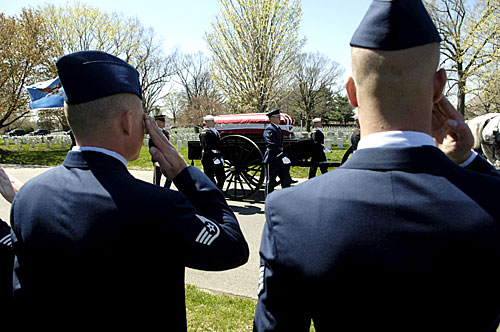
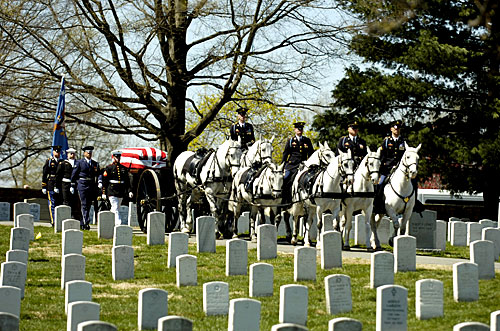
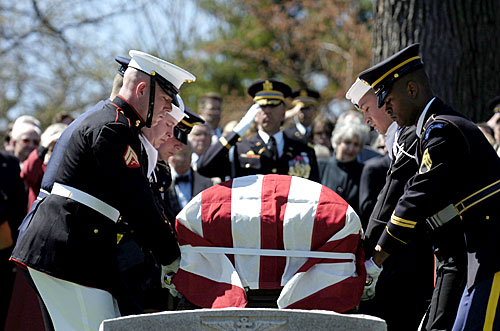
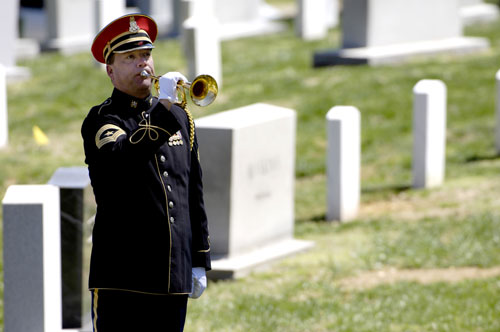
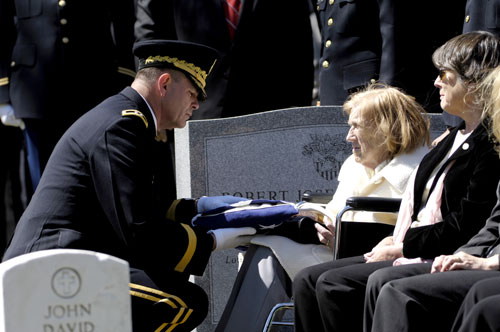
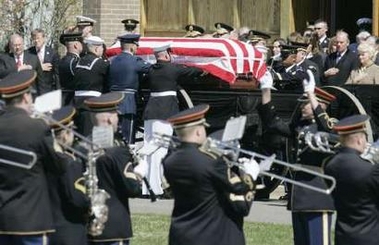
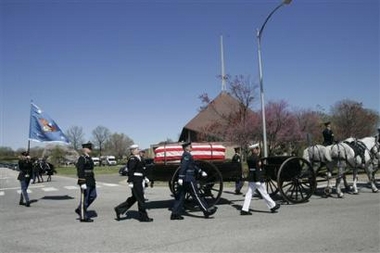
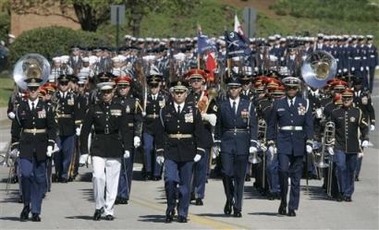
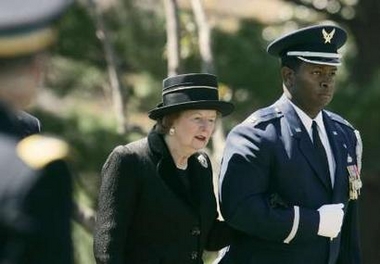
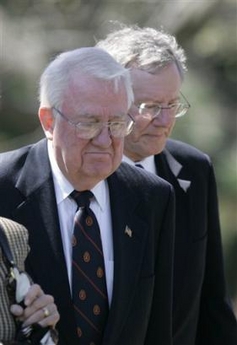
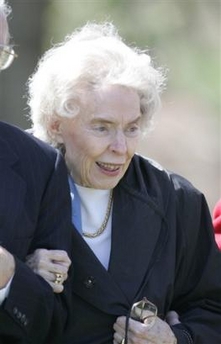
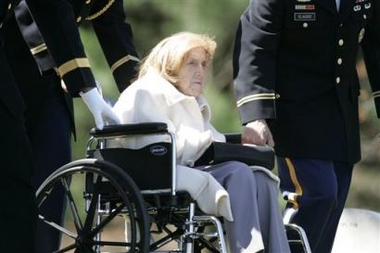
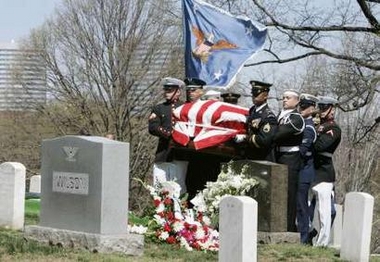
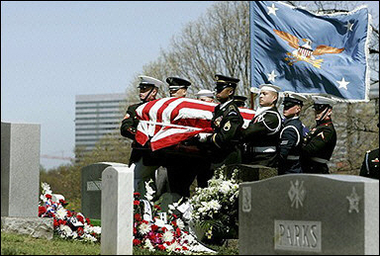
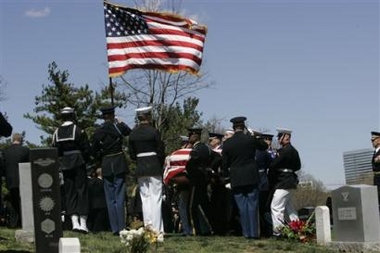
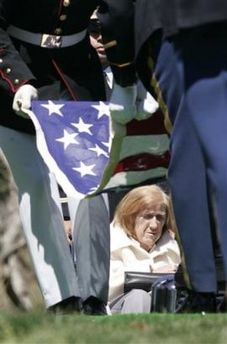
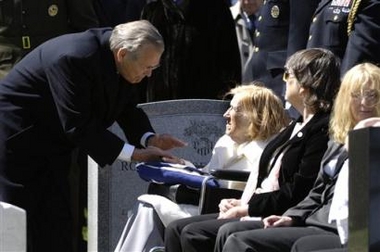
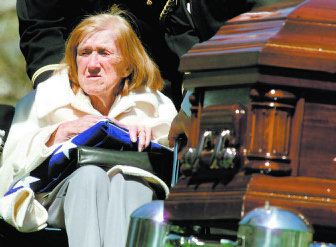
WEINBERGER, CASPER W
CPT US ARMY
WORLD WAR II
- DATE OF BIRTH: 08/18/1917
- DATE OF DEATH: 03/28/2006
- BURIED AT: SECTION 30 SITE 835-1
ARLINGTON NATIONAL CEMETERY
Michael Robert Patterson was born in Arlington and is the son of a former officer of the US Army. So it was no wonder that sooner or later his interests drew him to American history and especially to American military history. Many of his articles can be found on renowned portals like the New York Times, Washingtonpost or Wikipedia.
Reviewed by: Michael Howard

